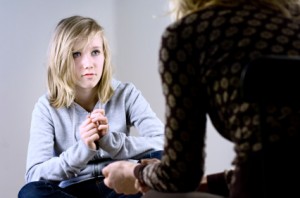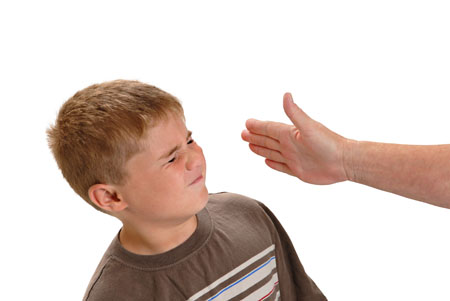Maternal Warmth Does Not Negate Corporal Punishment
New research shows that expressions of maternal warmth following corporal punishment do not reduce children’s anxiety, and may even increase it.
The study by Jennifer E. Lansford and colleagues was published in the Journal of Clinical Child & Adolescent Psychiatry. The researchers interviewed over a thousand children aged 7–10 and their mothers about what type of physical punishment occurs in their family, and about anxiety and aggression in the children. They followed up again after one and two years. The study took place in eight countries: China, Colombia, Italy, Jordan, Kenya, the Philippines, Thailand, and the United States.
In general, corporal punishment increased anxiety in the children, while maternal warmth decreased it. How warmth and physical punishment interacted depended on the country. Anxiety increased over time in families where the mothers were high on both corporal punishment and warmth. Lansford and colleagues wrote that it might be “simply too confusing and unnerving for a child to be hit hard and loved warmly all in the same home.”
The researchers suggest that parents use nonphysical ways to promote desirable behavior in their children, including putting younger children in time-out and requiring teenagers to participate in activities that help others.
Loss of Appetite or Weight in Depressed Parents Predicts Depression in Children
 Depression in a parent is one of the factors that best predicts whether a young person will develop depression. Since depression symptoms can vary greatly from person to person and some symptoms are known to be more heritable than others, new research is investigating whether a parent’s profile of symptoms affects their child’s likelihood of developing the illness. A 2013 study by Mars et al. in the Journal of Clinical Psychiatry suggests that loss of appetite or weight in a parent with depression is the symptom that most strongly predicts new onset of depression and depressive symptoms in their offspring.
Depression in a parent is one of the factors that best predicts whether a young person will develop depression. Since depression symptoms can vary greatly from person to person and some symptoms are known to be more heritable than others, new research is investigating whether a parent’s profile of symptoms affects their child’s likelihood of developing the illness. A 2013 study by Mars et al. in the Journal of Clinical Psychiatry suggests that loss of appetite or weight in a parent with depression is the symptom that most strongly predicts new onset of depression and depressive symptoms in their offspring.
The study observed 337 parent-child pairs. The parents (mostly mothers), who had a history of recurrent unipolar depression, ranged in age from 25–55 years, and their children ranged from 9–17 years. The study lasted four years, during which the families participated in three assessments. Parents’ symptoms were recorded and children were also assessed for symptoms or new development of depression. Thirty percent of the offspring whose parents reported weight loss or low appetite were found to have new onset of depression at followup, compared to nine percent of the offspring whose parents did not have these symptoms.
There are nine symptoms used to diagnose depression in the Diagnostic and Statistical Manual for Mental Disorders: low mood, loss of interest (anhedonia), loss of energy, change in appetite or weight, change in sleep, low self-esteem or guilt, suicidality, psychomotor slowing (retardation), and loss of concentration or indecisiveness. Of these, parental loss of appetite or weight was the only symptom that predicted depression in a child. Interestingly, the severity of parental depression or the presence of other health problems in the parent did not account for the emergence of illness in the children.
Important Reminders from the APA Symposium on Special Topics in Bipolar Disorder
Our editor Robert M. Post served as discussant at a symposium on special topics in bipolar disorder at the 2013 meeting of the American Psychiatic Association. Here are some of the findings that were presented at the symposium.
Michael Gitlin of the University of California, Los Angeles (UCLA) emphasized the importance of treating patients until remission in order to achieve functional recovery and prevent cognitive impairment.
Michael Bauer of Dresden, Germany reviewed data showing that early onset of the illness and long delays to first treatment are important predictors of poor response to treatment.
Mark Frye of the Mayo Clinic discussed the promise of pharmacogenomics to aid in the selection of the best medicine for a given individual (i.e. personalized medicine). Currently the presence of one of a few relatively rare gene variations—HLA-B 1502 (in Asian populations) and HLA-A 3101 (in European populations)—can predict that an individual may develop a severe rash when taking the anticonvulsant carbamazepine. Researcher J. Rybakowski has found that a somewhat common variant in the gene responsible for producing brain-derived neurotrophic factor (the val-66-met allele for proBDNF) is associated with a good response to lithium. This may be explained by the fact that lithium increases BDNF, and this could be crucial in those with the val-66-met allele, which functions less efficiently than the more common and better functioning allele val-66-val.
David Miklowitz, also of UCLA, reviewed data that strongly indicates psychotherapy is effective in the treatment and prevention of bipolar depression. He and Kiki Chang of Stanford University found that family focused therapy (FFT) was effective in treating early syndromes that sometimes lead to bipolar disorder (including depression, anxiety, or BP-NOS) in children at high risk for bipolar disorder because of a family history that includes bipolar disorder in a first degree relative. Yesterday we shared the 8 key ingredients to family focused therapy.
In his discussion, Post emphasized several points from each presentation. Among these was the recommendation by both Gitlin and Bauer that patients use a personal calendar to monitor symptoms and side effects. (We offer an easy download of a personal calendar.)
Post also endorsed Bauer’s emphasis on the need for early intervention, since delay to first treatment is an independent risk factor for a poor outcome in adulthood. (This finding has been replicated in three studies — Franchini et al. in 1999, Post et al. in 2010, and Drancourt et al. in 2012.
Each of these factors and family focused therapy need greater attention in the US, since Post noted that all aspects of bipolar disorder are more difficult for patients in the US compared to those in Germany, the Netherlands, and many other European countries. About two-thirds of the adults with bipolar disorder in the US had onset of the illness before age 19, while in most European countries, only about one-third of adult patients had an early onset. These data are also consistent with the low incidence of bipolar disorder in children at high risk for the disorder because of a parent with bipolar disorder in studies from the Netherlands, Switzerland, and Germany. In contrast, similar studies of children with at least on parent diagnosed with bipolar disorder in the US (by Chang et al., Nurnberger et al., Wozniak et al., and Birmaher et al.) show a higher incidence of the illness. Canadian studies by Duffy et al. and studies of an isolated Amish community in Pennsylvania by Egeland et al. show a low incidence much like the Europeans.
Given the great need for care of children with signs of bipolar disorder in the US and the shortage of child psychiatrists and pediatricians knowledgeable about bipolar disorder, Post recommended that in the absence of other alternatives, adult psychiatrists of parents with bipolar disorder who have children with the disorder should fill this gap by treating the children themselves. If the child has only early symptoms, family focused therapy as described by Miklowitz above would be recommended.
Tomorrow and Friday we’ll share tables with recommendations for the treatment of parents with bipolar disorder and their children.
Family Environment, Cognitive Functioning, and Quality of Life Among Depressed Adolescents with Bipolar Disorder
At the 2012 meeting of the American Academy of Child and Adolescent Psychiatry, Arman Danielyan presented a poster on psychosocial, cognitive, and behavioral characteristics of youth in a depressive phase of bipolar disorder. These adolescents had lower scores on a variety of measures.
Adolescents with bipolar depression had significantly lower scores on 7 of 10 family environment scales measuring the quality of family interaction, communication, and emotional tone. They also exhibited significant impairment in cognitive function, particularly executive functioning, and all domains of psychosocial health were substantially lower than US normative data.
The authors concluded that bipolar depression affects multiple domains of adolescents’ lives including their cognitive, psychosocial, and family functioning. This suggests that the involvement of the whole family in the treatment process would be beneficial.
The impaired cognitive functioning these young people face is associated with lower quality of life, and ways of addressing this better are clearly needed.
Editor’s Note: In a previous BNN we reported on the efficacy of Family Focused Therapy (FFT), which was pioneered by David Miklowitz. This therapy is effective for adolescents and adults with bipolar disorder and for adolescents who are at high risk for the disorder because of two factors: having a parent with the disorder and having preliminary symptoms of bipolar disorder not otherwise specified (BP-NOS), depression, or an anxiety disorder. Kiki Chang, a respected authority on child and adolescent psychiatry, recommends FFT for children and adolescents with bipolar disorder and those at high risk for it.
Parental Nurturing Linked to Greater Hippocampal Volume in Young Children
An article published by Medscape reports that in a recent study by Dr. Joan Luby of Washington University School of Medicine in St. Louis, non-depressed preschool children whose parents showed more nurturing behaviors during a mildly stressful task were found to have hippocampal volume almost 10% greater than their peers whose parents showed fewer nurturing behaviors. The hippocampus affects cognitive functioning and emotion regulation.
Unfortunately, parental nurturing did not effect the hippocampal volume of children with early-onset depression.
Dr. Luby and colleagues think their findings could have “profound public health implications and suggest that greater public health emphasis on early parenting could be a very fruitful social investment.”
“The finding that early parenting support, a modifiable psychosocial factor, is directly related to healthy development of a key brain region known to impact cognitive functioning and emotion regulation opens an exciting opportunity to impact the development of children in a powerful and positive fashion”.
Primary Care Doctors Important in Detecting and Managing Childhood Mental Illness
The National Alliance on Mental Illness (NAMI) conducted a survey to determine ways that primary care providers can better communicate with parents about a child’s mental illness. In a news release NAMI executive director Michael Fitzpatrick said, “Most Americans rely on family doctors and pediatricians for early detection of mental illness and in many cases treatment.”
NAMI concluded that primary care providers could play a larger role in detecting mental illness in children. They found that in 63% of families, the first signs of behavioral or emotional problems were evident in children by age 7. More than half of families reported that their primary care physicians were not knowledgeable about mental health treatments. Almost two-thirds of families reported that their primary care providers were not knowledgeable about local resources to support families with mentally ill children.
NAMI’s suggestions for primary care providers included educating themselves about early-onset mental illness and local resources for families, providing screening tools for parents and youth in order to encourage discussion of mental health, emphasizing that mental health is as important as physical health to a child’s wellbeing, asking questions about mental health as a routine part of office visits, and listening to families’ concerns without judgment.
Primary care providers are also encouraged to let families know that there is hope and that they are not alone in facing this difficulty, that mental illness in a child is not the parents’ fault, and that their children have many strengths.
Primary care doctors should also be prepared to: refer a mentally ill child to psychiatrists, psychologists, and other specialists if needed; follow up, including collaborating with other healthcare providers to develop and implement a treatment plan; and encourage patients and their families.
Dialectical Behavior Therapy Effective for Adolescents with Bipolar Disorder
As we posted yesterday, therapeutic approaches appear necessary for childhood-onset bipolar disorder. In a poster at the Pediatric Bipolar Conference in Cambridge, Massachusetts in March, Tina Goldstein of Western Psychiatric Institute in Pittsburgh presented an open study indicating that dialectical behavior therapy (DBT) was effective for adolescents with bipolar disorder. This is the second study that has produced these results. In DBT, patients are taught coping skills and mindfulness in order to break the cycle of responding to dysregulated emotions with problematic behaviors.
Psychotherapy Necessary for Bipolar Disorder and Severe Mood Dysregulation in Children
 Dr. Janet Wozniak of Massachusetts General Hospital initiated a survey, both at MGH and in the field, to ascertain practitioners’ experience with individual and family psychotherapeutic and educational approaches to childhood-onset bipolar illness. These types of approaches appear fundamental to treating children or families in which there is bipolar illness.
Dr. Janet Wozniak of Massachusetts General Hospital initiated a survey, both at MGH and in the field, to ascertain practitioners’ experience with individual and family psychotherapeutic and educational approaches to childhood-onset bipolar illness. These types of approaches appear fundamental to treating children or families in which there is bipolar illness.
It was the view of Wozniak, her survey, and many other investigators in attendance at the Pediatric Bipolar Conference in Cambridge, Massachusetts in March that such psychotherapeutic approaches are needed, and often recommended, but the availability of effective treatment and of therapists skilled in administering any of these psychotherapies in children is often lacking.






